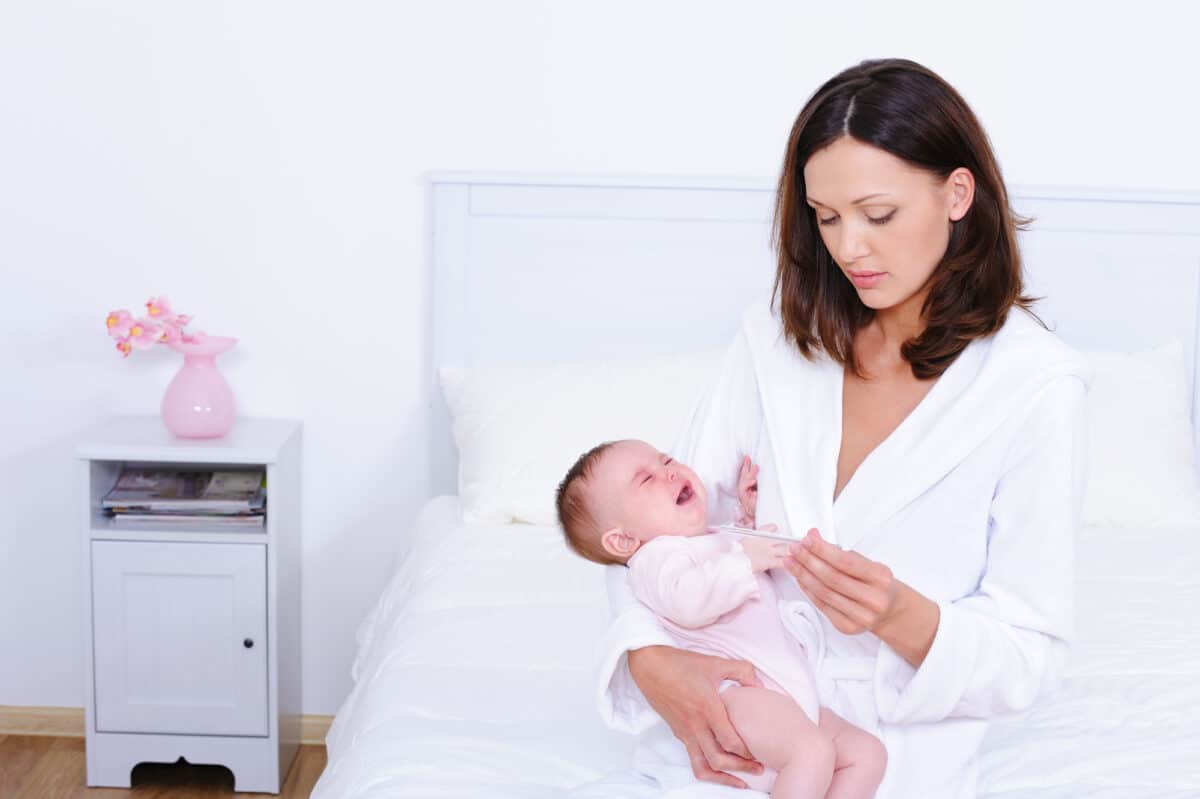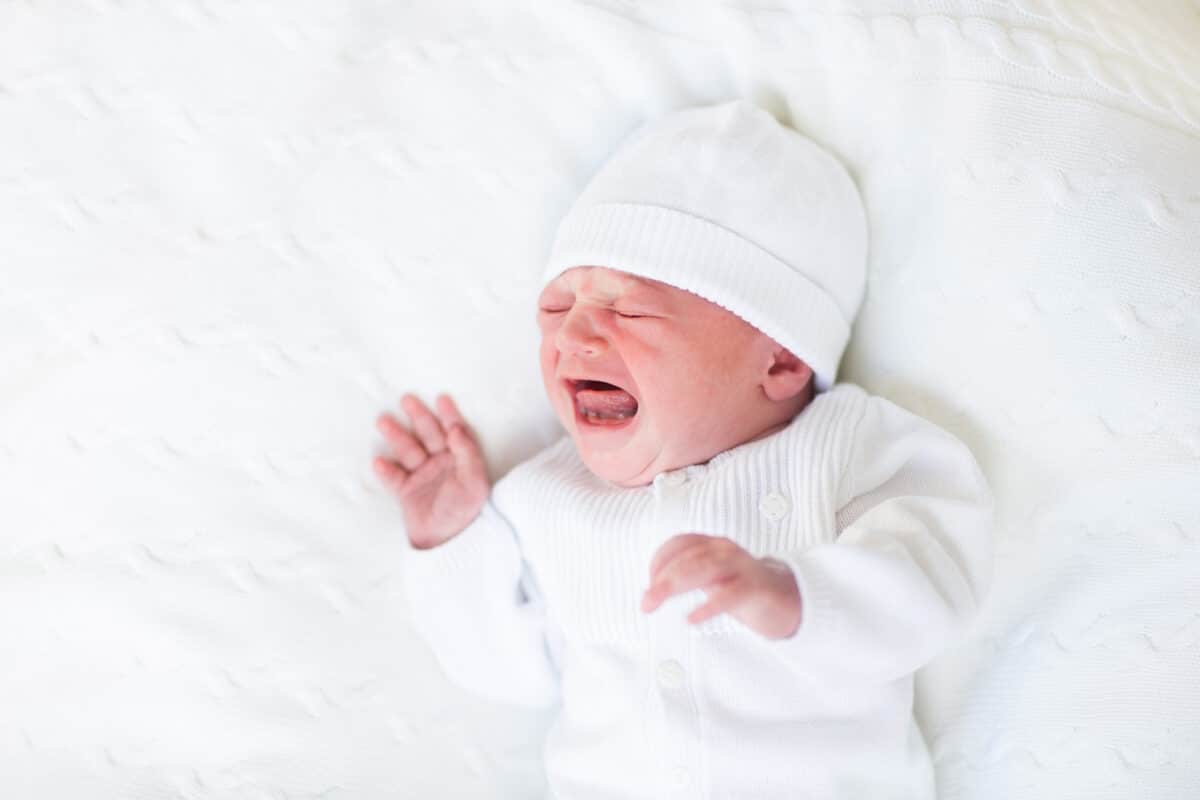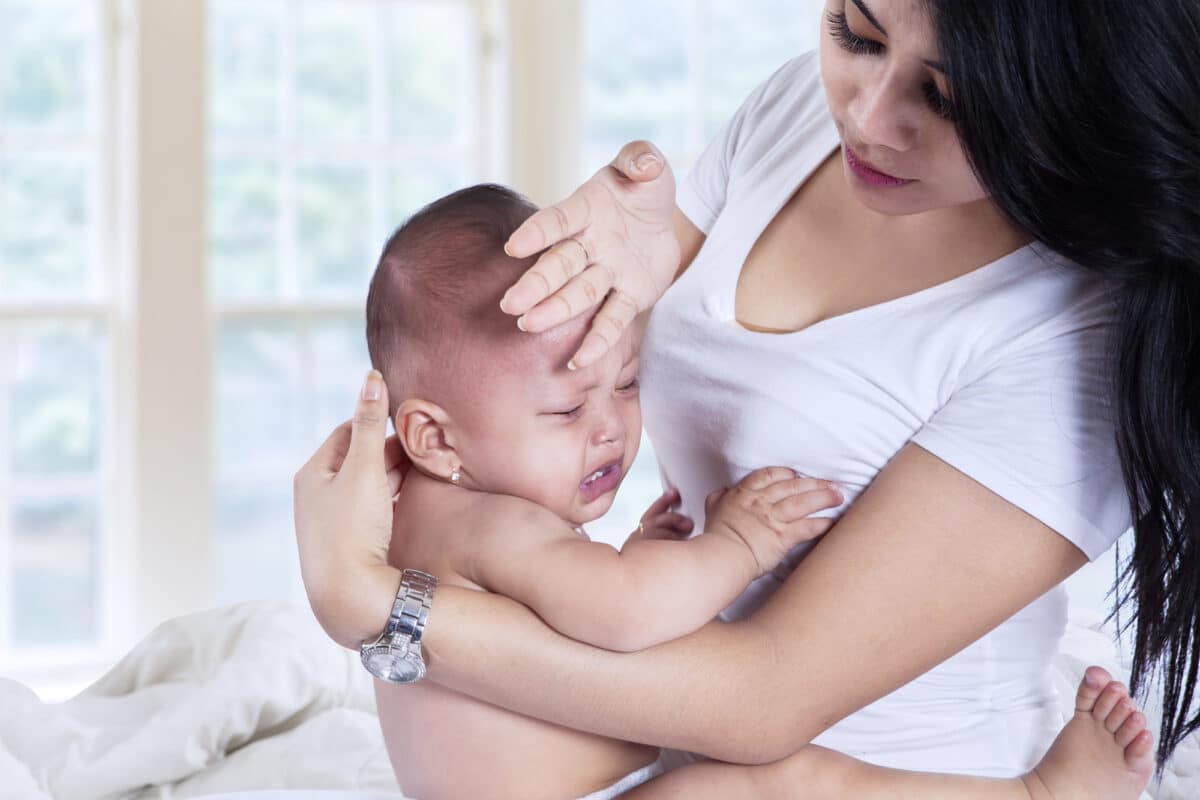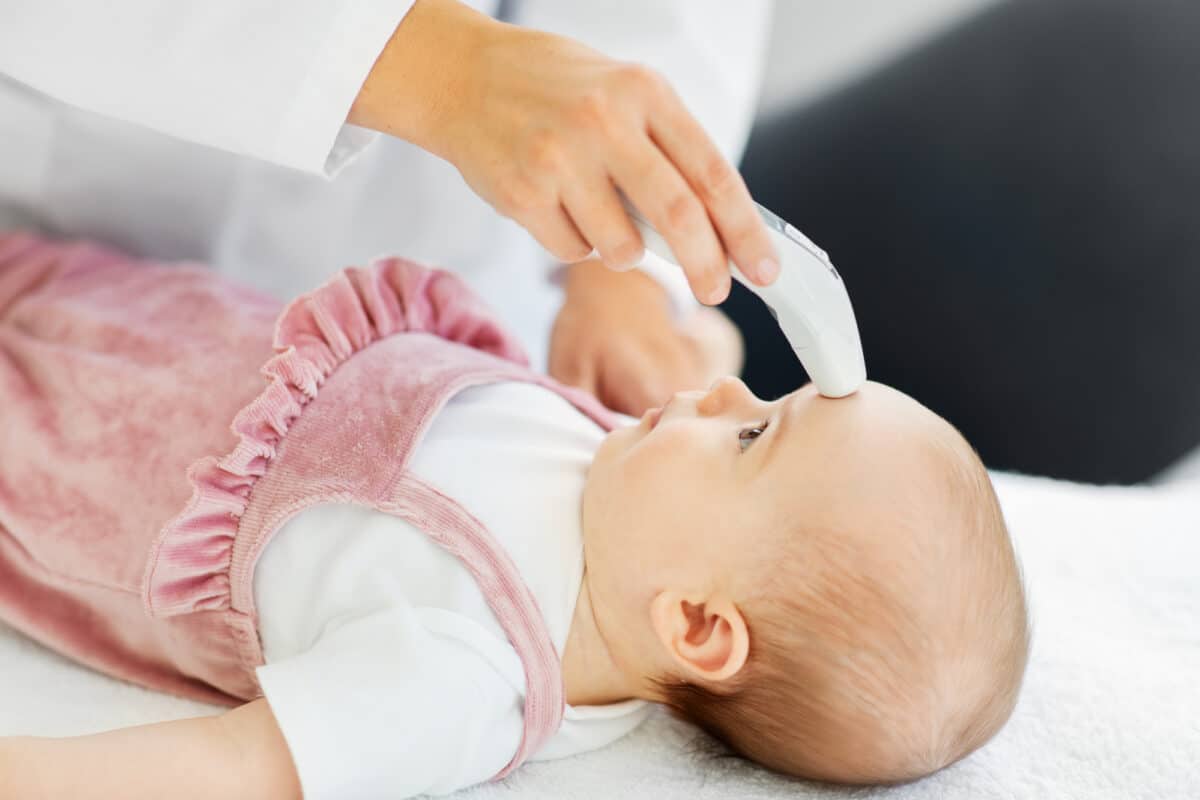Newborn Fever: When to Worry

Your baby’s first illness is never fun.
Here’s how to identify (and treat) a newborn fever.
Having a baby is a time of joy and excitement.
Sure, those sleepless nights are tiring, but the newborn smell, baby yawns, and cute smiles cause you to melt into a puddle on a regular basis. Then there are the trying (or downright scary) times, like your baby’s first illness. And fewer things cause more anxiety than a newborn fever.
We know it can be scary, but don’t fret. Read on to find out what can cause a fever in newborn babies, when to worry, and what to do about it.
What Is a Newborn Fever?
What is a newborn’s temperature supposed to be? It’s hard to pinpoint an exact number, because every body is different. However, an acceptable range (of a rectal measurement) is a low of 96.8 upon waking, all the way up to 100.3 later in the day.
In a newborn, a rectal temperature of 100.4 Fahrenheit or higher is considered a fever. If this sounds low, remember that newborns are tiny and their immune systems are not fully developed, so a fever in a newborn is a much lower temperature than a fever in a 5-year-old child.
For babies 0-1 month old, a fever is considered an emergency. Although you may not need to call 911, you will likely need to go to the emergency room. For babies older than one month, consult with your pediatrician for further care instructions.
Fever Symptoms In A Newborn
Signs of fever in newborns can vary depending on the child’s immune system and what is causing the fever. In fact, sometimes it can be difficult to recognize a fever in baby because they can mimic normal newborn behavior. It’s important to be mindful of any changes and take their temperature if you notice these symptoms. And remember, it’s better to be safe that sorry. If you feel like there’s been a rise in body temperature, checking it out causes no harm.
- Crying/Fussiness – For some, this will be the first sign of a fever or illness. Sure, babies cry a lot, but if you’re experiencing a prolonged episode of inconsolable crying, it could be a fever.
- Excessive Fatigue – Newborns already sleep a lot, but if your baby starts favoring naps above eating, a fever could be to blame.
- Reduced Appetite – Most babies will let you know when they’re ready for their next meal. If your baby suddenly has no interest, take their temperature to be safe.
- Cold/Flu Symptoms – If your baby has developed a cough or congestion, check their temperature, too. (Then notify the pediatrician.)
- Spitting Up – Again, spit up is normal in babies, but if it’s more frequent and in excess quantities, this could point to vomiting rather than spitting up.
- Feeling Warm – This seems obvious, but it can be hard to gauge the temperature of your baby, especially on a warm day. Taking their temperature internally (rather than just feeling their forehead) is the best way to be sure.
- Pulling At Ear – Ear infections can cause discomfort in the ears. Because baby cannot communicate with words, pulling at their ear is a tell-tale sign that they are feeling pain or discomfort in that area.
- Rash – Any type of rash should be evaluated by your pediatrician. Especially if your baby has been exposed to or has chicken pox symptoms.
Causes of Newborn Fever
Remember, a fever is a symptom, not an illness. A newborn fever is a clue that something else is going on.
The first cause of a fever is a common virus. Babies are especially vulnerable to viruses, so it is easy for them to pick up a cold or flu. While you likely have plenty of friends and family who want to meet your new baby, make sure that all visitors wash their hands and stay home if they’re sick.
Babies can also display a fever if they’ve gotten overheated.
A lot of parents think that their babies need to be bundled in several layers of clothing at all times but babies are actually quite good at regulating their body temperatures and don’t need much more than you do to feel comfortable. A general rule of thumb is to dress your baby in one extra layer than you’re wearing. For example, if you’re in short pajamas, put them in long pajamas plus a swaddle.
Another cause for newborn fever, consider dehydration. In their first few days, babies can become dehydrated if mom’s milk hasn’t come in or you haven’t figured out the right adjustments for formula. This is why your pediatrician asks how many wet/dirty diapers they have in a day.
Bacterial infections are another cause for fevers in newborns. This is the main reason why a fever can be an emergency. Since newborns cannot communicate, it will take a doctor’s knowledge to determine what the cause of your baby’s fever is. Bacterial infections include things like spinal infections, urinary tract infections, and bacterial meningitis.
Don’t let Aunt Peggy tell you that your baby’s fever is due to teething either. It would be atypical for a newborn to teethe, and it’s an old wive’s tale that infants develop fevers when teething.
How To Take Your Newborn’s Temperature
Ear and forehead thermometers are easy to use, but rectal thermometers are the most accurate. Why? Unlike the ears and skin, the rectum is not influenced by outside factors such as a cool day or sun exposure. (If all you have is a forehead or ear thermometer, that’s fine, too.). A normal newborn temperature on the forehead is again, between 96.8 and 100.4 degrees Fahrenheit.
First, clean the thermometer with alcohol or soap and water. Gently lay your newborn on their tummy with their knees underneath them or on their back, holding their feet above their head.
If you want to use a little petroleum jelly or coconut oil to help glide the thermometer, that’s fine but not necessary. The tip of the thermometer should only go in ½-1 inch. Do not go further than this, as you could puncture the baby’s rectum walls.
Wait until the thermometer beeps and read the temperature. If it’s above 100.4, and the baby has been unbundled for 10 minutes, it’s time to call the doctor.
How To Treat a Newborn Fever
For newborns—that is, babies under one month old—it’s crucial to consult with your pediatrician first.
If your baby is under one month (or four weeks) they may instruct you to head to the emergency room to test for bacterial meningitis. (It’s not common, but it’s best to rule it out.)
If we are speaking about older babies, then your doctor will probably tell you to try some acetaminophen (Tylenol) to bring the fever down. Always check with your pediatrician (or the dosing instructions) for the proper amount.
You can also give your baby some lukewarm baths—not hot, not cold. Dress them in light clothing and make sure they’re getting plenty of hydration. If your baby is breastfed, there is no harm in feeding them more than usual (if they’re interested).
Conclusion
Whether you’re a first-time parent or a seasoned pro, newborn fevers are never ideal.
You’re already stressed enough with the diapers, lack of sleep, and constant crying. Adding an illness to the mix is the last thing you need. Make sure to follow the advice above, don’t Google too much, and call your pediatrician.
Call us today if you have a question or need an appointment so that we can help your baby on their way back to health.
Kid Care Pediatrics
Kid Care Pediatrics has been in existence since October 2001. It was established by Omar A. Gomez, M.D. The practice philosophy at Kid Care Pediatrics is to provide quality pediatric medical care for children in a professional yet caring manner.



